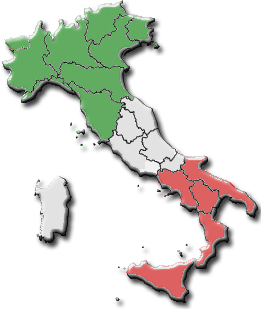
|
ITALIAN ... a site about the italian language |


|
| Home | Verbs | Nouns | Adjectives | Adverbs | Figures etc. | Pronunciation | Phrases | About Italy | Links |
| Nouns (Nomi italiani) |
Print this page 
|
Italian nouns end in -o, -a, -tà, -e and, rarely, in -(t)ú.
The nouns are either feminine
 or masculine
or masculine
 ,
and are conjugated in singular and pluralis. ,
and are conjugated in singular and pluralis.
|
|||||||||
Feminine 
|
|||||||||
|
Normally, nouns ending on -a and -tà are feminine.
Nouns ending on -trice, -tudine, -zione (-sione), -gione, -tú are feminine. But there are nouns ending on -o which are feminine: Show |
|||||||||
Masculine 
|
|||||||||
|
Normally, nouns ending on -o are masculine.
Nouns ending on -tore, -sore -ore, -ione etc. are masculine. The noun tribú is masculine. But there are nouns ending on -a which are masculine: Show |
| Pluralis | |||||||||||||||||||
| Generally pluralis is derived according to the following rules: |
| Sing. | Plur. | Sing. | Plur. | Sing. | Plur. | Sing. | Plur. | Sing. | Plur. | Sing. | Plur. | Sing. | Plur. | ||||||
| -o | -i | -a | -e | -e | -i | -tà | -tà | -tù | -tù | -è | -è | -i | -i | ||||||
| -ico | -ici | -ica | -iche | -cho | -chi | -go | -ghi | -ga | -ghe | -cia | -ce | -cia | cie | ||||||
| -cìa | -cie | -io | -i | -ìo | -ii | -ia | -ie | ||||||||||||
|
Nouns ending with an accented vowel or a consonant do not change in the plural, nor do the abbreviated words. Ex: caffè → due caffè, film → due film, foto → due foto. In other cases the plural is recognized by external indicators as articles, pronouns etc. Ex: il tribù → i tribù, la città → le città, l'analisi → gli analisi, la virtù → le virtù. A greater number of masculine nouns in -o have two forms in plural: one in -i (masculine) and another in -a (feminine). Often the forms in -a are preserved in idiomatic expressions, but sometimes the different plural forms are associated with change in the meaning. Ex: anèllo (lo) (ring), pluralis: anèlli (gli) (rings), anèlla (le) (curly hairs, literary). Cìglio (il) (eyelash, curb), pluralis: cigli (i) (curbs, edges), cìglia (le) (eyelashes) |
|||||||||||||||||||
| The indefinite and the definite article | |||||||||||||||||||
|
The indefinite article Masculine: un (uno if the nouns initial letter is z, s + consonant or gn) Feminine: una (un if the nouns initial letter is a wowel). The definite article Masculine, singular: il (lo if the nouns initial letter is z, s + consonant or gn). Masculine, pluralis: i (gli if the nouns initial letter is z, s + consonant or gn). Feminine, singular: la. Feminine, pluralis: le. |
|||||||||||||||||||
| The partitive article | |||||||||
| Gender | Number | Article | Contraction of | ||||||
| Masculine | Singular |
del dell' dello |
di + il di + l' di + lo |
||||||
| Masculine | Plural |
dei degli |
di + i di + gli |
||||||
| Feminine | Singular |
della dell' |
di + la di + l' |
||||||
| Feminine | Plural | delle | di + le | ||||||
| Nouns which are similar i both genders | |||||||||
|
Some nouns are similar in both genders:
Show
|
|||||||||
| Nouns which has different meanings in feminine and masculine | |||||||||
|
Other nouns has different meanings in feminine and masculine:
Show
|